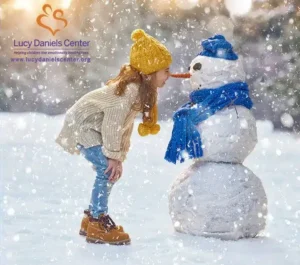 We hold up the holiday season as a time of peace on earth, goodwill, and joy, so it can be frustrating or distressing when you find yourself feeling anything but peaceful and joyful at this time of year due to dysregulated children, family squabbles, and expectations that do not live up to reality.
We hold up the holiday season as a time of peace on earth, goodwill, and joy, so it can be frustrating or distressing when you find yourself feeling anything but peaceful and joyful at this time of year due to dysregulated children, family squabbles, and expectations that do not live up to reality.
Changes in children’s behavior usually indicate a change in how a child is feeling, or that they are having difficulty managing their feelings on their own, and there are many changes to routines (e.g., travel, visits with relatives, and breaks from school) that occur in the lead up to and during the winter holiday season. These changes may have a greater impact on some children than others; some children may seem more excitable and have a harder time settling down, while others may seem clingy or regressive. In addition to changes in the routine, there can also be the anticipation of something magical on the horizon as the countdown to the gift-giving season begins.
Popular themes and traditions around Christmastime help build the excitement and anticipation of the holiday. For many families these include themes in songs about Santa (“He sees you when you’re sleeping, he knows when you’re awake, he knows if you’ve been bad or good…”), visits and letters to Santa, and more recently, the “Elf on the Shelf” who reports to Santa what he or she sees daily. These traditions are, of course, intended to be fun, whimsical, and a source of wonder for young children, but they can also be a source of stress and unhappiness despite adults hoping these can be cherished memories with their loved ones over the holidays.
Many children can handle these magical elements of Christmas without becoming too worried about the consequences of their missteps or “bad” behavior. However, some children who struggle with impulse control or have a particularly heavy conscience may worry that their behavior will result in fewer or no gifts. Some children in our school, for example, have voiced these concerns over the years, with some even saying that they are worried that they will only receive coal. If your family is one that wants to include Santa or Elf on the Shelf as a holiday tradition but also has a more vulnerable or sensitive child, they can benefit from comments that help put their behavior into perspective and ease some of the worry, such as, “Santa and his elves know that you are good” or “Santa knows you feel bad when you do (behavior) and he knows you are good.” In a time of year when children feel a little extra pressure to “be good,” a few simple words like this can go a long way to ease some of the anxiety and ensure that the holiday season is as stress-free and joyful as possible for all.
Helping your child feel heard, understood, and accepted when they’re struggling with their feelings around the holidays can help them to better engage with the traditions that bring you joy, and may even help you create some new traditions that will grow with your family. Don’t be dismayed by social media’s image of what the holidays should look like, or the thought of ‘this is the way we always do things, and that can’t change” – make traditions that work for you and have a wonderful holiday.
